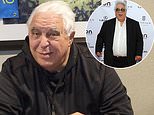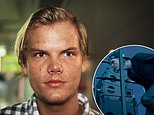She's a brilliant Cambridge graduate. So why does Annabel blame herself for giving her son DYSLEXIA?
- In 2011, Annabel Cole's son Kit was diagnosed with severe dyslexia
- She and her husband read that learning disabilities could be hereditary
- Annabel read early, did well at school and went on to study at Cambridge
- She's since learnt she has dyscalculia - like dyslexia but with numbers

Annabel Cole pictured with her son Kit, who has severe dyslexia
For years, we faced the same struggle every night as our son Kit learned to read. While his classmates whizzed through book after book, he would stumble over words like ‘cat’ and ‘dog’.
Sometimes, he dissolved into tears; at other times there would be flashes of anger and frustration — from me and him.
When Kit was seven, a teacher suggested we have his learning ability assessed. At first my husband and I were relieved when, in 2011, severe dyslexia was diagnosed — at last we had a reason for his cripplingly slow progress and the chance to get proper help.
But we had read that learning disabilities could be hereditary, yet no one in our immediate family appeared to have problems with reading and writing. So where on earth had this come from?
I learned to read early, did well at school and went on to read English at Cambridge. I’ve worked for 20 years as a national newspaper journalist.
My husband is a successful businessman who was also an academic high-flyer. We have three children: Elsa, 16, and Rosa, 13, are both academically gifted.
The youngest, Kit, now 11, isn’t slow: he has a sophisticated vocabulary, is good with numbers and blessed with wisdom beyond his years. His IQ, we have discovered, puts him in the top two per cent. Yet he couldn’t even write his own very short name by the age of seven. So where did his problem originate?
The answer to that question was very close to home. It came from me.
While words and language are the great love of my life, I’ve always been hopeless at maths. Ask me to tot up a shopping bill, or work out how to split the cost of a restaurant meal, and I break out in a cold sweat.
Recently, I went for tests to see if there was more to this struggle with numbers than I thought — only to be told, at 43, that I suffered from dyscalculia (like dyslexia but with numbers, not words). I was also told it was highly likely that I’d passed my learning difficulty to my son.
This was a shock: I knew dyslexia could be hereditary — it’s said to account for half of all cases — but I assumed any parent who passed it on would have reading problems themselves. And I never imagined someone like me could be unaware of a learning disability.
It is difficult to explain how this makes you feel. Guilty? Undoubtedly. Who could fail to feel that crushing sense of responsibility for passing on such a burden to their child?
It also made me wonder how many members of my generation would have all manner of learning issues diagnosed, were they to attend school today.
Alastair Coomes, a dyslexia specialist teacher who conducted my assessment, agrees: ‘It’s very likely there are many more people out there in your situation at your age.’
According to the British Dyslexic Association, its free helpline receives a large number of calls from parents who suspect they may be dyslexic themselves after their child is deemed to have the condition.
And when they find out there is an inherited link, it can go two ways.
‘Often people find it helps them to be more understanding and patient with their children. They also have a sense of achievement for having coped with their own difficulties for so long,’ says Alastair. ‘But it can also be a terrible shock, throwing up buried feelings about their own painful experiences at school.’

Talented: Annabel Cole pictured at her Cambridge University graduation in 1994 when she was 22 years old
That certainly was the case with me. In the classroom, my one academic blackspot was maths: my inability to grasp even the most basic principles filled me with horror and shame.
Memories of my primary school in Edinburgh are haunted by one particular teacher who would scream at me, in front of the class, on a daily basis.
At secondary school I was in the bottom set for maths, but somehow scraped a C in my GCSE, with an awful lot of help and cramming.
However, my ineptitude has been far more burdensome in adult life. To this day, I can’t write out numbers longer than four digits (tell me that something costs £25,000 and I’ll struggle to express that as a figure) and have no idea how to grasp the breakdowns on utility bills or work out supermarket special offers.
I must be the only person in Britain who was relieved when my cleaner’s rate of pay went up from £8 to £10 an hour, making her wages easier to calculate. I even put the wrong number of candles on a birthday cake for one of my daughters when she turned five.
My problem is not confined to calculations. I find timings hard and get dates wrong. Yet it never crossed my mind there might be something wrong with me. Family and friends said: ‘You can’t be good at everything.’ That’s what I thought, too.
It was only after Kit’s diagnosis, and a particularly frustrating incident last month when I wrote out a cheque wrongly by a couple of zeros, that I sought the help of Alastair Coomes, who assessed me.
Alastair says maths is an overlooked problem area: ‘It is somehow socially acceptable to say you can’t do maths. If you are at a dinner party and tell people you can’t add up, they are likely to think it’s amusing and move on. If you told those same people you couldn’t read, they would be horrified and urge you to seek help.’
But dyscalculia — an inability to grasp how numbers relate to each other — is thought to affect at least five per cent of the British public, ie some 3.5 million people.
‘Dyscalculia is about 30 years behind dyslexia in terms of awareness,’ explains Alastair. ‘None of the adults that I see had it picked up at school. Their educational problems were often put down to laziness or bad behaviour.’
Dyslexia, which affects around one person in ten, has benefited from publicity and government investment in learning support, while dyscalculia awareness has lagged behind though, as I have discovered to my cost, it can often lead to significant difficulties later in life.


Annabel Cole (pictured left) when she was five years old on her first day of school and (right) at her MA ceremony in 1997
To ascertain my diagnosis, Alastair set me a series of tests. We started with a maths paper, in which I had 15 minutes to answer 40 questions. I sighed with relief when I looked at the first: 2+1. Even I could manage that one.
But things went downhill rapidly from there. By question nine I was counting on my fingers, and when we hit percentages I started skipping questions. At long division, waves of schoolgirl panic flooded over me.
Alastair then encouraged me to estimate 966 divided by 12. I couldn’t even manage a ballpark figure. Maths was followed by a spelling test and reading test, which I happily breezed through.
Next we embarked on tests designed to look at brain function. Phonological awareness, being able to identify and manipulate the sounds that make up words, is something Kit really struggles with. For me, it was a doddle.
Next to be tested, though, was ‘working memory’ — our ability to manipulate information we are holding in our brain and it is a common feature of learning difficulties. This is particularly significant in maths.
Alastair read out sequences of numbers of increasing length and asked me to repeat the digits in reverse order. After just three digits, I faltered. The average person manages seven.
We finished with some mental calculations. Alastair asked me to subtract 65 from 73. I had to count up from 65 on my fingers. At least I got there in the end.
For the final question he asked me to divide 4,500,000 by ten. I know this should be simple but I couldn’t even come up with a rough ‘guesstimate’. I answered 4,500, with no idea if this was even close.
Alastair’s results were conclusive. I have dyscalculia.
I felt the same relief wash over me as I did when Kit had his dyslexia diagnosed. But how are his special needs and mine connected?
‘Kit’s problems may differ from yours, but it’s clear that you both share a predisposition to specific learning difficulties,’ said Alastair. And while scientists haven’t yet identified the precise link between dyslexia and dyscalculia, they insist the high rate of crossover between the two proves a connection.
Tim Francis, an educational psychologist, has developed an online screening system for dyscalculia.
He explains: ‘The connection here is a weakness in the brain’s executive function — the mental skills that help us carry out complex cognitive processes such as problem-solving. Immaturity of executive function, which manifests itself in specific learning difficulties, is hereditary.’

Annabel Cole's son Kit was diagnosed with severe dyslexia in 2011 and at last they had a reason for his slow progress
My diagnosis has been a blessing for both Kit and me. As a loving mother, it has increased my empathy for him... but also for everyone like him. And it has given me a fresh wave of optimism: there were times, early on, when looking into his future terrified me. Watching his daily struggles with writing, reading and planning — all essential components in writing an essay, one of the main ways of assessing children today — was agonising.
One of the hardest times was when Kit came home from school and said that he was ‘stupid’. Now I know — for I am walking, talking proof for him — that special needs do not mark you out for a life of failure. Thankfully, with renewed self-confidence, he is progressing.
After a slow start, Kit’s reading improved by the age of ten, though writing and spelling are still a huge challenge. But he has dyslexia support in school, and it doesn’t just mean extra time in exams: sometimes a teaching assistant can act as a scribe, writing out answers dictated by Kit.
When it comes to homework, technology is a great help: mind-mapping software, a visual notation system, helps him to plan essays, and he uses a dictation app to get his ideas down.
We often talk about how his dyslexia makes him feel. Kit tells me the worst part is when he is working in class, looks around and sees everyone else working ten times as fast as him: ‘You feel isolated, as if you will never catch up. You feel angry and sad and impossible.’
Moving into secondary school, as Kit has done this year, he faces an increased workload and the looming prospect of GCSEs.
We’ve had to change the way we approach schooling and the idea of achievement. A string of A*s is often seen as the academic pinnacle, but Kit’s dyslexia has opened my mind.
He still excels in some areas. For example, he loves the Lord Of The Rings books, and Conan Doyle’s Sherlock Holmes stories.
The only difference is that he listens to them on audiobooks rather than reading them.
And he is lucky enough to attend a school with fabulous facilities, which even include a forge. At his headmistress’s suggestion, Kit began working there and is now an accomplished blacksmith.
When I had my learning difficulty diagnosed, Kit admitted it made him feel less alone: ‘I think you’ll be able to understand more what it feels like to be me.’
Overall, though, our diagnoses have utterly blindsided me. While Kit’s problems are no longer a mystery, of all the things that we have shared as a mother and son, I had never imagined that special educational needs would be one of them.
Most watched News videos
- Scottish woman has temper tantrum at Nashville airport
- Tesla Cybertruck explodes in front of Trump hotel in Las Vegas
- Mass panic as New Orleans attacker flies down Bourbon street
- Shocking moment zookeeper is fatally mauled by lions in private zoo
- Horrific video shows aftermath of New Orleans truck 'attack'
- Meghan Markle celebrates new year in first Instagram video
- Tesla Cybertruck burns outside Trump hotel in Las Vegas
- See how truck that drove into crowd made it through police barrier
- Cheerful Melania Trump bops to YMCA at Mar-a-Lago NYE bash
- New Orleans terror attack suspect reveals background in video
- Plane passenger throws drink at flight attendant in boozy fight
- Horrifying moment yacht crashes into rocks and sinks off Mexico coast









































































































































































































































































































































































